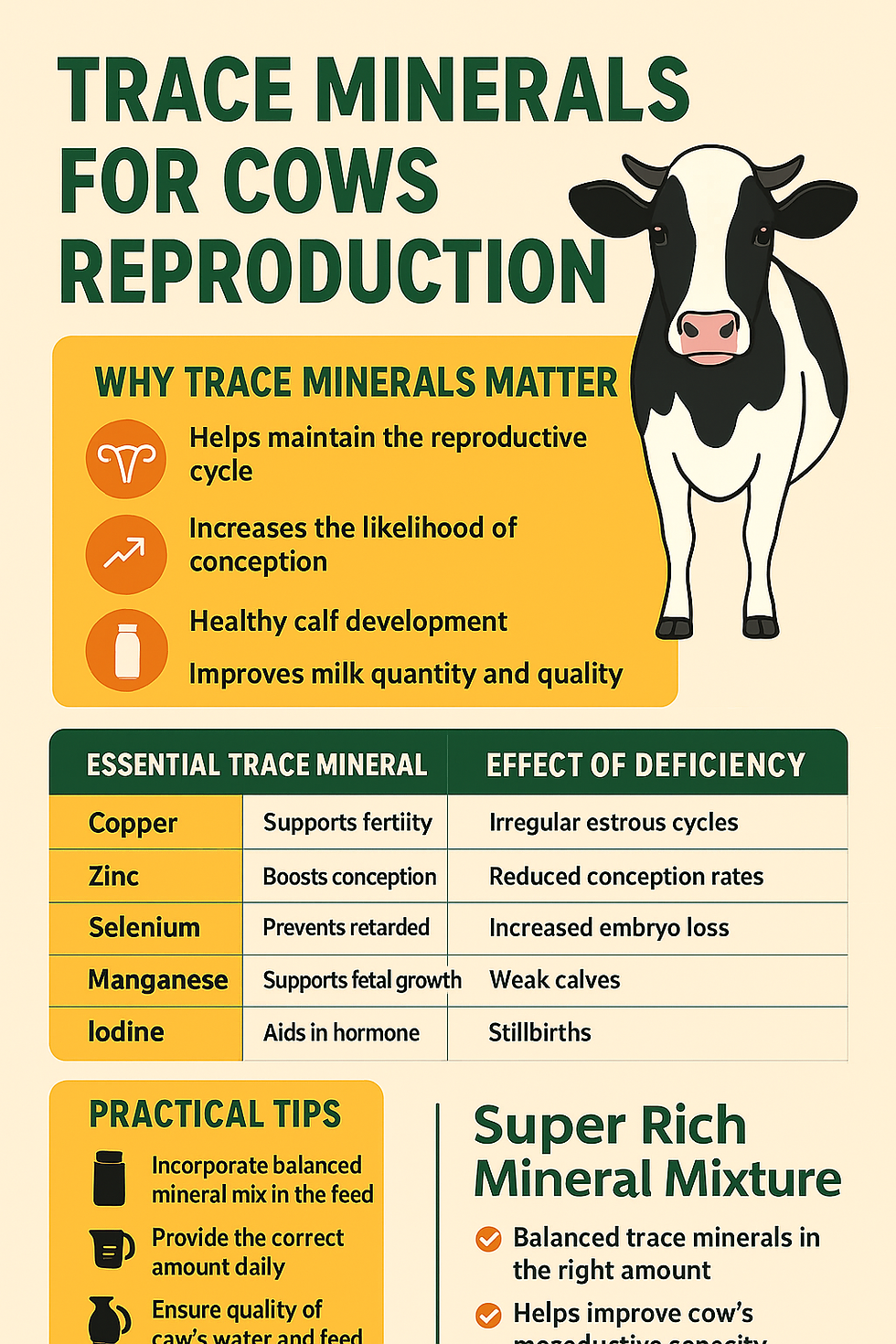Trace Mineral for Cows Reproduction
- KafilaAgro CattleFeed
- Aug 13, 2025
- 4 min read
Trace Mineral for Cows Reproduction – Complete Guide
Reproduction in dairy cows depends on more than just good feeding — trace minerals play a vital role in improving fertility, calving rates, and overall herd health. Without proper mineral balance, even the best breeding program can face delays and low conception rates.
(If you’re facing repeated breeding failures, you may also want to read our guide on Why Cows Fail to Conceive for more detailed troubleshooting.)

What You’ll Learn in This Post
What Are Trace Minerals?
Trace minerals are minerals that cows need in very small amounts, but their role in the body is huge. For reproduction, the most important trace minerals include:
Zinc (Zn) – Supports ovulation and healthy follicle development.
Copper (Cu) – Boosts immune system and hormone balance.
Manganese (Mn) – Helps with heat cycles and embryo development.
Selenium (Se) – Prevents retained placenta and improves conception.
Cobalt (Co) – Supports vitamin B12 synthesis for energy and metabolism.
Iodine (I) – Essential for healthy calf development during pregnancy.
(Curious about cost-effective mineral formulations? See our BIS-Compliant Mineral Mixture Formula that meets government standards.)

Why Trace Minerals Matter in Reproduction
When cows don’t get enough trace minerals:
Heat cycles become irregular.
Conception rates drop.
Calves may be born weak or underdeveloped.
Placenta retention issues increase.
A balanced trace mineral program ensures:
Stronger heat signals
Higher conception rates
Healthy, full-term calves
Faster recovery after calving
Recommended Levels of Trace Minerals for Reproduction
Trace Mineral | Function in Reproduction | Recommended Level (per kg feed) |
Zinc (Zn) | Ovulation, follicle health | 40–60 mg |
Copper (Cu) | Hormone regulation, immunity | 10–15 mg |
Manganese (Mn) | Heat cycle regulation, embryo growth | 40–50 mg |
Selenium (Se) | Prevents retained placenta | 0.3–0.5 mg |
Cobalt (Co) | Vitamin B12 production | 0.1–0.2 mg |
Iodine (I) | Calf development, thyroid function | 0.5–1.0 mg |
How to Ensure Your Cows Get the Right Minerals
Balanced Feed – Use feed that contains the correct mineral mix.
Mineral Supplements – Provide loose minerals or mineral blocks.
Regular Checkups – Test feed and blood mineral levels.
Targeted Supplements – Use specific mineral mixtures for breeding season.
A Practical Solution – Super Rich Mineral Mixture
For farmers who want a ready-to-use solution, our Super Rich Mineral Mixture is specially formulated with the correct levels of trace minerals for cows’ reproduction. It supports:
Improved heat cycle regularity
Higher conception rates
Strong calf growth
Faster recovery after calving
FAQs on Trace Minerals for Cows Reproduction
Q1. How do trace minerals improve reproduction in cows?
Trace minerals like copper, zinc, manganese, selenium, and cobalt help regulate hormones, improve heat signs, and increase conception rates. They also support udder health and immunity.
Q2. How long before breeding should I give trace minerals?
Ideally, start supplementing at least 60–90 days before breeding so the cow’s body has enough time to store and use the minerals effectively.
Q3. Can I give trace minerals to pregnant cows?
Yes. Pregnant cows need trace minerals to support fetal development, reduce the risk of weak calves, and ensure proper postpartum recovery.
Q4. How are trace minerals given to cows?
They can be provided through mineral mixtures, fortified cattle feed, lick blocks, or boluses. Consistency is important — sudden gaps in supplementation can affect fertility.
Q5. What happens if cows don’t get enough trace minerals?
You may notice poor heat signs, low conception rates, retained placenta, weak calves, low immunity, and overall poor milk production.
Q6. Can too much trace mineral cause harm?
Yes. Excessive intake of certain minerals (like copper) can be toxic. Always follow recommended feeding guidelines.
Q7. Do all cows need the same trace mineral levels?
No. Requirements may vary based on age, lactation stage, milk yield, and breed. High-yielding and breeding cows need more precise mineral balance.
Q8. Are trace minerals more important in summer or winter?
Both seasons affect mineral needs — heat stress in summer and low-quality fodder in winter can both cause deficiencies, so year-round supplementation is best.
Q9: Are natural sources enough?
A: Many soils and fodders lack certain trace minerals, so supplementation is necessary. You can even prepare a budget-friendly mix yourself—check our DIY ₹40 Mineral Mixture Recipe for details.
📍 Contact Information
Office: GT Road, Deona, Begusarai, Bihar
Factory: Industrial Area, Sant Kabir Nagar, Khalilabad (UP)
Phone: +91-6201001535
Website: kafilaagro.com
🌐 Connect with Us
🐦 Twitter (X) – Updates, product news & agri insights🔗 Follow Us
💼 LinkedIn – Industry trends & professional networking🔗 Connect Here
📱 WhatsApp Channel – Exclusive offers & instant updates🔗 Subscribe Now
📘 Facebook – Latest posts & product highlights🔗 Like Us
📷 Instagram – Photos, reels & behind-the-scenes🔗 Follow Here
▶ YouTube – Product videos & farmer stories🔗 Watch Now
⭐ Google Review – Share your feedback & experience🔗 Write a Review


